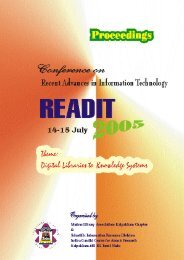READIT-2007 - Indira Gandhi Centre for Atomic Research
READIT-2007 - Indira Gandhi Centre for Atomic Research
READIT-2007 - Indira Gandhi Centre for Atomic Research
You also want an ePaper? Increase the reach of your titles
YUMPU automatically turns print PDFs into web optimized ePapers that Google loves.
Building digital libraries: Librarians are having rich experience of organizing<br />
knowledge. This can help them to build in-house digital libraries to capture organizations<br />
knowledge, codify and make available to all. Libraries can become multimedia publishers<br />
of its staff projects. This in turn enhances the process of knowledge discovery in the<br />
organization.<br />
Building rich catalog of resources: Libraries now required providing access to<br />
materials available in digital <strong>for</strong>m anywhere on the web and their role as in<strong>for</strong>mation<br />
evaluators or navigational guides becoming important. Libraries can help users to make<br />
choices about freely available material and or rank, evaluate different services or sources<br />
available on the net.<br />
Building communities: Libraries can acts as places of social and expert<br />
networks. It can host tools <strong>for</strong> social networking, develop guides <strong>for</strong> specialized<br />
disciplines to help researchers navigate through the subject. Further, they can provide<br />
access and retrieval of knowledge produced through these networks <strong>for</strong> future use.<br />
Domain experts: Libraries can develop domain expertise to provide consultation<br />
services to researchers.<br />
Content integrators: Libraries will be encouraged to combine various sources of<br />
content from different sources and service providers including the internal content into<br />
one large offering <strong>for</strong> users’ access. Thus in<strong>for</strong>mation professionals can thrive to delivers<br />
the right content, to the right people, at the right time by focusing on business process<br />
management of the organization. This requires librarians to understand roles,<br />
responsibilities and business needs of the organization. Also, they can deploy content<br />
effectively through licensing agreements or other means.<br />
4. CONCLUSION<br />
Library staff requires understanding how different the world of knowledge<br />
became and they should be flexible and agile to learn new skills required managing and<br />
progressing in the new world. This would mean librarians to act navigation guides in<br />
knowledge world to users, embracing new technologies and changes and finally being<br />
proactive in dealing with in<strong>for</strong>mation policy issues in the organization.<br />
REFERENCES<br />
1. Hillenbrand, C. (2005). Librarianship in the 21st century – crisis or trans<strong>for</strong>mation?<br />
Australian Library Journal. 54(2)<br />
2. Changing Roles of Academic and <strong>Research</strong> Libraries This essay derives from a<br />
Roundtable on Technology and Change in Academic Libraries, convened by the<br />
Association of College and <strong>Research</strong> Libraries (ACRL) on November 2-3, 2006 in<br />
Chicago.<br />
207

















